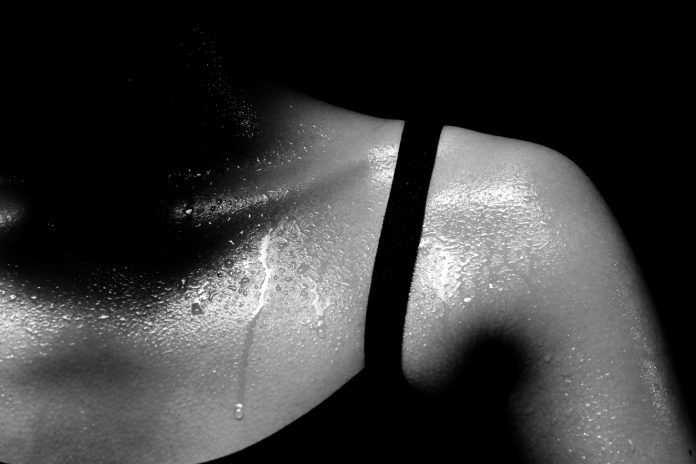Humans possess 2-4 million sweat glands, and these produce 2-4 L of sweat per day, increasing to to 3-4 L per hour during exercise. But despite being such a common bodily function, many still ask why do we sweat? Let’s find out:
- Why do we sweat?
- How does sweating help control blood pressure?
- What’s the risk of dehydration from sweating?
- Are there additional health benefits from sweating?
- Can sweating be harmful to health?
Why do we sweat?
A 2019 physiology review considered the up-to-date medical literature on human sweat and sweating. Here’s what they found:
- Control body temperature
- The main reason we sweat is to control body temperature. Sweating is a major part of the body’s thermoregulatory mechanism. When sweat evaporates from the skin, it takes heat from the body, lowering body temperature
- Control of blood pressure and salt (sodium)
- Sweating is important to control the level of salt (sodium chloride) in the body. Sodium is lost from the skin during sweating. This mechanism plays an important part in blood pressure control. However, the physiology of salt metabolism is complex and mainly takes place in the kidney. Interestingly, a low-salt diet can lower blood pressure but does not necessarily alter the rate of sweating. Excess sweating can cause sodium depletion (hyponatraemia) which is a dangerous medical condition.
- Part of the immune defence mechanism of the skin
- When we sweat, water, sodium and other micronutrients, including antimicrobial peptides which form part of the skin’s immune defence system, are transported to the skin surface.
- Minerals and toxic products are lost in sweat
- Trace minerals such as zinc, iron, calcium and copper are also lost in sweat. However, dietary intake of these minerals does not affect the amount lost in sweat, so this is not believed to be a function of sweating.
Other substances excreted in sweat include bicarbonate, alcohol (sweating is increased in a hangover), glucose and ammonia.
Toxic products such as pollutants and heavy metals are excreted in sweat, but there is no firm evidence this is a fundamental method of detoxification.
How does sweating help control blood pressure?
The blood concentration of sodium plays a large physiological role in both the rate of sweating from the skin and blood pressure control.
When the body gets too hot, thermal sensors in the skin send messages to the temperature control centre in the hypothalamus of the brain. This switches on the body’s cooling mechanisms, the dilatation of skin blood vessels and an increase in sweating. Specialised cells within the sweat glands are triggered to take in more sodium and excrete this excess sodium into the sweat. The hormone aldosterone (active in the kidney, see below) causes sweating to be reduced and sodium to be conserved.
When we sweat, we lose fluid volume. The kidney senses this because blood pressure starts to fall. The drop in blood pressure stimulates the renin–angiotensin–aldosterone system in the kidney. Renin is an enzyme that leads to the production of angiotensin II, which then stimulates the production of aldosterone. Aldosterone stimulates sodium reabsorption in the kidney so that the sodium is returned to the bloodstream and not excreted in the urine. As a result, blood levels of sodium increase which then draws water into the circulation to maintain the osmotic balance. As the fluid volume increases, this restores blood pressure to its rightful value.
What’s the risk of dehydration from sweating?
How much fluid do we need?
The human body needs to be well-hydrated to conduct its normal physiological and metabolic functions. For everyday life, drinking 2-2.5 L of water per day is recommended. In hot weather, we sweat more, the amount of fluid we need increases rapidly, and we easily need an extra litre of fluid. People outside in hot sun, working in hot temperatures or athletes, may need 10 L of fluid per day.
Hydration, dehydration and kidney stones
Dehydration leads to the build-up of waste products in the kidneys, ureter or bladder. Crystals can form in the urine, which clump together to form stones. Kidney stones often contain calcium and oxalate, but also sometimes, urate, struvite or cystine.
Kidney stones are common in the UK. 9% (1 in 11) of people will have a kidney stone in their lifetime.
It’s extremely important to ensure we regularly drink enough fluids to keep well-hydrated and flush the kidneys to prevent the creation of kidney stones.
Hydration, dehydration and exercise
The NHS recommends a minimum of 150 minutes of moderate-intensity exercise (MIT) a week. This is any form of aerobic exercise that makes you slightly sweaty and out of breath – such as brisk walking, jogging, cycling, swimming or dancing. But sweating means we need to drink more fluids to avoid dehydration.
Ideally, drink 450 ml of fluid 2-4 hours before exercise. The best thing to drink is plain water. But if doing high-intensity workouts, which means sweating more vigorously, it’s a good idea to drink sports drinks that also replenish electrolytes.
Are there any additional health benefits of sweating?
Aids the circulation
A 2018 systematic review of 40 studies, some of which were randomised controlled trials, concluded numerous health benefits from taking a regular sauna. The most convincing benefit was a reduction in cardiovascular disease (CVD). Heat stress can be good for the heart, because as the body heats, the heart rate increases, but peripheral blood vessels become dilated, reducing peripheral vascular resistance. There are beneficial changes to the sympathetic and parasympathetic nervous system resulting in a lowering of both systolic (upper reading) and diastolic (lower reading) blood pressure.
However, saunas are not recommended for anyone with established CVD – angina, a recent heart attack or a stroke – as there are reports of increased sudden death due to cardiac arrhythmias.
Causes muscle relaxation
Lactic acid is produced by exercising muscles and is mostly metabolised by the liver. Lactate is found in sweat, but having reviewed the evidence, experts do not believe this is one of the main functions of sweat. Studies show that exercising can cause sweat-lactate levels to both rise or fall and are not related to exercise intensity. Raised blood lactate levels are not related to sweat lactate levels.
May improve some health conditions
Saunas can be beneficial for those with fibromyalgia, Rheumatoid Arthritis, ankylosing spondylitis and chronic fatigue.
One 2016 Finnish study reported that men aged 42-60, taking a sauna 4-7 times a week, had a 66% reduction in developing Alzheimer’s Disease. However, this was an observational study, and these do not prove causation.
Can sweating be harmful to health?
Saunas may be harmful in some circumstances. Taking regular saunas has been shown to lower the sperm count, result in falls in the elderly, and cause ‘sauna lung’ and non-exertional heatstroke.
Saunas do not improve acne. In fact, a 2023 acne review, concluded that heavy sweating worsens acne. Excess sweating lowers levels of dermcidin – an antimicrobial peptide. Low levels of dermcidin in the pilosebaceous follicles (hair follicles attached to sweat glands) lead to an overgrowth of the bacteria Propionibacterium acnes, a major cause of acne. Excess sweating also results in pores being clogged with dead skin cells and other debris.
You can reduce your chance of acne from sweating by regularly cleansing the skin, using acne treatments containing salicylic acid or benzoyl peroxide, and using an oil-free moisturiser. Wash immediately after exercise, with warm water and soap, and pat the skin dry gently with a towel. Wipe equipment down after use. Don’t share other people’s sportswear.
Why do we sweat: Final thoughts
We need to sweat to stay healthy, but our bodies have to make sure we drink enough fluid to make up for the salt and water lost through the skin. Sweating may not feel nice, but it has various essential roles to play. It’s critical for the control of body temperature, blood pressure and sodium levels, plus has other health benefits. If we don’t drink enough water to compensate for water lost in sweating, we risk dehydration and kidney stones. We all need to consciously make ourselves drink more because our feelings of thirst are often not very pronounced.
- Are you drinking enough water every day?
- Why not try a free water app that reminds you to drink during the day?
This piece was written and provided by Dr Deborah Lee, Dr Fox Online Pharmacy
Editor's Recommended Articles
-
Must Read >> Getting enough sleep is vital for healthy ageing
-
Must Read >> The effects of sleep deprivation on your skin














